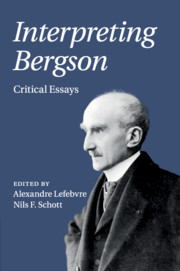Book contents
- Interpreting Bergson
- Interpreting Bergson
- Copyright page
- Contents
- Figures
- Contributors
- Abbreviations
- Introduction
- Chapter 1 Bergson’s Theory of Truth
- Chapter 2 What Was “Serious Philosophy” for the Young Bergson?
- Chapter 3 Bergson and Naturalism
- Chapter 4 Bergson on the True Intellect
- Chapter 5 Bergson’s Philosophy of Art
- Chapter 6 Bergson, the Time of Life, and the Memory of the Universe
- Chapter 7 Bergson and Philosophy as a Way of Life
- Chapter 8 Bergson and Social Theory
- Chapter 9 Bergson and Political Theory
- Chapter 10 Bergson, Colonialism, and Race
- Chapter 11 Bergson’s Philosophy of Religion
- Bibliography
- Index
Chapter 9 - Bergson and Political Theory
Published online by Cambridge University Press: 22 November 2019
- Interpreting Bergson
- Interpreting Bergson
- Copyright page
- Contents
- Figures
- Contributors
- Abbreviations
- Introduction
- Chapter 1 Bergson’s Theory of Truth
- Chapter 2 What Was “Serious Philosophy” for the Young Bergson?
- Chapter 3 Bergson and Naturalism
- Chapter 4 Bergson on the True Intellect
- Chapter 5 Bergson’s Philosophy of Art
- Chapter 6 Bergson, the Time of Life, and the Memory of the Universe
- Chapter 7 Bergson and Philosophy as a Way of Life
- Chapter 8 Bergson and Social Theory
- Chapter 9 Bergson and Political Theory
- Chapter 10 Bergson, Colonialism, and Race
- Chapter 11 Bergson’s Philosophy of Religion
- Bibliography
- Index
Summary
The chapter explores the rich resonances of Bergson’s philosophy in the field of politics and political thought, demonstrating how Bergson’s later thought provides crucial insights for contemporary problems and debates. It shows how Bergson takes up a Rousseauian strand of political theory that exploits the productive inconsistencies of the republican tradition and situates him within a realist tradition going back to early Christianity (with Pascal as his central reference) that resonates with current realist conceptions of the political. The chapter then moves to consider ways in which Bergson’s conceptions speak to - and disrupt - debates concerning nationalism and cosmopolitanism in political theory today, and in particular, debates between partialists, cosmopolitans, and dualists. Highlighting Bergson’s own participation in politics, the chapter then discusses Bergson’s contribution to the thinking of human rights via one of his early readers, the Canadian diplomat John Humphrey, whose notion of process serves as the motif of the essay’s concluding critical assessment of Bergson’s notion of democracy as a work in progress.
Keywords
- Type
- Chapter
- Information
- Interpreting BergsonCritical Essays, pp. 155 - 171Publisher: Cambridge University PressPrint publication year: 2019

